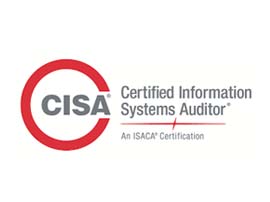Certified Information Systems Auditor (CISA)
In this course, you'll cover all six domains of the Certified Information Systems Auditor (CISA) exam and gain the knowledge and technical concepts required to obtain CISA certification. Since its inception in 1978, the CISA exam has become the gold standard of excellence in IS auditing, control, and security. Our experts have created a study guide of relevant, up-to-date information, including summary charts, insightful data, and practice exams.
Certified Information Systems Auditor (CISA)
The components of the training program include:
• Instructor-led
• 5 days (40 Hours)
Overview:
In this course, you’ll cover all six domains of the Certified Information Systems Auditor (CISA) exam and gain the knowledge and technical concepts required to obtain CISA certification. Since its inception in 1978, the CISA exam has become the gold standard of excellence in IS auditing, control, and security. Our experts have created a study guide of relevant, up-to-date information, including summary charts, insightful data, and practice exams.


